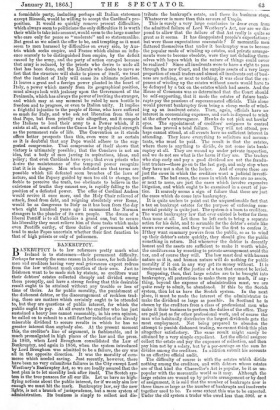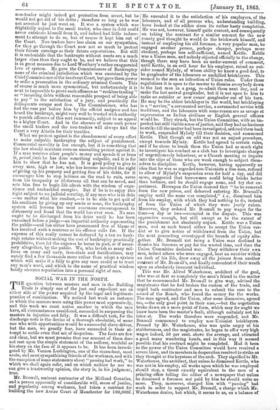BANKRUPTCY. B ANKRUPTCY is to law reformers pretty much what Ireland
is to statesmen—their permanent difficulty. Perhaps for nearly the same reason in both cases, for both Irish- men and creditors having very real grievances expect redress from the law without much exertion of their own. Just as Irishmen want to be made rich by statute, so creditors want their debtors' estates collected cheaply and divided among them promptly, and have a strong feeling that this desirable result ought to be attained without any trouble or loss of time of theirs. As for public morality, the punishment of the dishonest debtor, or the discouragement of reckless trad- ing, these are matters which certainly ought to be attended to, but they are questions of public interest, for which the public ought to pay. At all events the creditor who has just sustained a heavy loss cannot reasonably, in his own opinion, be called on to submit to a still further reduction of an already miserable dividend to secure results in which he has no greater interest than anybody else. At the present moment this, the creditor's line of argument, is fashionable, and is much promulgated in high places of the law and the press. In 1849, when Lord Brougham consolidated the Law of Bankruptcy, and again in 1856, when the system introduced by Lord Brougham was admitted to be a failure, the cry was all in the opposite direction. It was the morality of com- merce which needed saving. Just recently, however, there have been no very calamitous failures in the City except Lord Westbury's Bankruptcy Act, so we are loudly assured that the best plan is to let morality look after itself. The Scotch sys- tem is the true panacea for all our ills. Let us have no high- flying notions about the public interest, for if we only aim low enough we must hit the mark. Bankruptcy law, say the new lights, is not a branch of jurisprudence, but a mere system of administration. Its business is simply to collect and dis- tribute the bankrupt's estate, and there its business stops. Whatsoever is more than this savours of Utopia.
This is surely a very large conclusion to draw even from the admitted failure of Lord. Westbury's Act, nor are we dis- posed to allow that the failure of that Act really is quite so great as it seems. It has disappointed people's expectations ; but were those expectations reasonable? If mercantile men flattered themselves that under it bankruptcy was to become the popular mode of winding up estates, and private arrange- ments were to become obsolete, were they not deluding them- selves with hopes which in the nature of things could never be realized ? Since all insolvents were to have a right to pass through the new Court, and the surplus assets of a very large proportion of small traders and almost all insolvents out of busi- ness are nothing, or next to nothing, it was clear that the ex- penses of winding up the estates without assets would have to be defrayed by a tax on the estates which had assets. And the House of Commons was so determined that the Court should be self-supporting, that it made the estates of future bank- rupts pay the pensions of superannuated officials. This alone would prevent bankruptcy from being a cheap mode of wind- ing up an insolvent estate. Then, again, officials have no interest in economizing expenses, and each is disposed to wink at the other's extravagance. Hawks do not pick out hawks' eyes. The appointment of creditors' assignees to control them has proved a total failure. They will not attend, per- haps cannot attend, at all events have no sufficient interest in attending. They leave everything to solicitors and accoun- tants, who must be paid. The result is that the estates, where there is anything to divide, do not come into bank- ruptcy at all. They are wound up under private inspection, and we do not see what is the harm if they are. The traders who stop early and pay a good dividend are not the fraudu- lent traders—these go on to the last gasp, and only stop when they have not a shot in the locker. And of course these are just the cases in which the creditors want a judicial investi- gation. The bad cases, the cases in which there are no assets, or next to none, are just the cases which involve expensive litigation, and which ought to be examined in a court of jus- tice. It scarcely seems a sign of failure that these are just the cases which do come into bankruptcy.
It is quite useless to point out the unquestionable fact that a tax on bankrupt estates for the purpose of enforcing com- mercial probity is quite just. The system is a boon to creditors. The worst bankruptcy law that ever existed is better for them than none at all. Let them be left each to bring a separate action for his debt, and to scramble for the debtor's estate like crows over carrion, and they would be the first to confess it. If they want summary powers from the public, so as to wind up their debtor's estate quickly, they should give the public something in return. But whenever the debtor is decently honest and the assets are sufficient to make it worth while, the creditors can by resorting to private arrangement avoid the tax, and of course they will. The law must deal with human nature as it is, and human nature will do nothing for public morality if it can in any way get its money without. It is irrelevant to talk of the justice of a tax that cannot be levied.
Supposing, then, that large estates are to be brought into bankruptcy, all pretentious to make them pay much, if any- thing, beyond the expense of administration must, we are quite ready to admit, be abandoned. If this be the Scotch system, then let us have the Scotch system. In the next place, it must be made the interest of the administrator to make the dividend as large as possible. In Scotland he is chosen by the creditors from a class of professional men who make it their business to perform the duties of the office. They are paid just as for other professional work, and of course the man who habitually distributes the largest dividends gets the most employment. Not being prepared to abandon the attempt to punish dishonest trading, we cannot think this plan altogether satisfactory. The same result might surely be attained by a very simple expedient. Let the official assignee collect the estate and pay the expenses of collection, and then pay him not by a salary, but by a per-centago on the sum he divides among the creditors. In addition submit his accounts to an effective official audit.
The difficulty of course is with the estates which divide nothing among the creditors, and with debtors whose estates are of that kind the Chancellor's Act is popular, be it as un- popular with the mercantile world as it may. Although the large estates are wound up by private arrangement or by deed of assignment, it is said that the number of bankrupts now is three times as large as the number of bankrupts and insolvents together used to be. To some extent this was to be expected. Under the old system a trader who owed less than 3001. or a non-trader might indeed get protection from arrest, but lie would not get rid of his debts ; therefore- so long as he was not arrested he just went on. It was a system which was frightfully unjust to the small trader, who once in debt could never extricate himself from it, and indeed had little induce- ment t3 attempt to do so, but of course it kept him out of the Court. Non-traders have less claim on our sympathies, for they go through the Court now not so much to protect their future earnings as their future expectations. But still it is undeniable that the bankrupts without assets are a much larger class than they ought to be, and we believe that this is in great measure due to Lord Westbury's rather exaggerated love of system. He gave the Commissioners of Bankruptcy none of the criminal jurisdiction which was exercised by the Chief Commissioner of the insolvent Court, but gave them power to order a prosecution in the ordinary criminal Courts. This of course is much more symmetrical, but unfortunately it is next to impossible to prove such offences as "reckless trading" or "incurring debts without reasonable prospect of being able to pay " to the satisfaction of a jury, and practically the delinquents escape scot free. The Commissioner, who has had the case put before him by the official assignee and has heard the bankrupt, might very well be trusted with authority to punish offences of this sort summarily, subject to an appeal to a higher Court. And in the absence of some such power the small traders and the non-traders will always find the Court a very Alsatia for their troubles.
What we protest against is the abandonment of every effort to make culpable bankruptcy the subject of punishment. Commercial morality is lax enough, but it is something that the law should maintain even an unavailing protest against it. If a man receives other people's money and spends it or loses it, priagi fade be has done something culpable, and it is for him to show that he has not. It is good policy to give to every man, high or low, who has become involved the right of giving up his property and getting free of his debts, for it encourages him to stop betimes on the road to ruin, saves from his incapacity or ill-fortune all that can be saved, and sets him free to begin life afresh with the wisdom of expe- rience and unshackled energies. But if he is to enjoy this right subject to no judicial scrutiny, if any man who is in debt —no matter what his conduct,—is to be able to get quit of his creditors by giving up any assets or none, the bankruptcy system will become the most enormous encouragement to dishonesty and fraud that the world has ever seen. No man ought to be discharged from his debts until he has been examined before a judge—an impartial authority representing the public—and has either been pronounced free of blame or has received such n sentence as his offence calls for. If the expense of this really cannot be defrayed by a tax on bank- rupt estates without making the cost of bankruptcy practically prohibitive, then let the expense be borne in part, or if neces- sary altogether, by the public. We, who lavish so many mil- lions on army and navy, iron-dads and fortifications, may surely find a few thousands more rather than adopt a system which will make it a folly to give any man credit or to trust any man's word, and which in the name of practical wisdom boldly elevates repudiation into a personal right of man.































 Previous page
Previous page